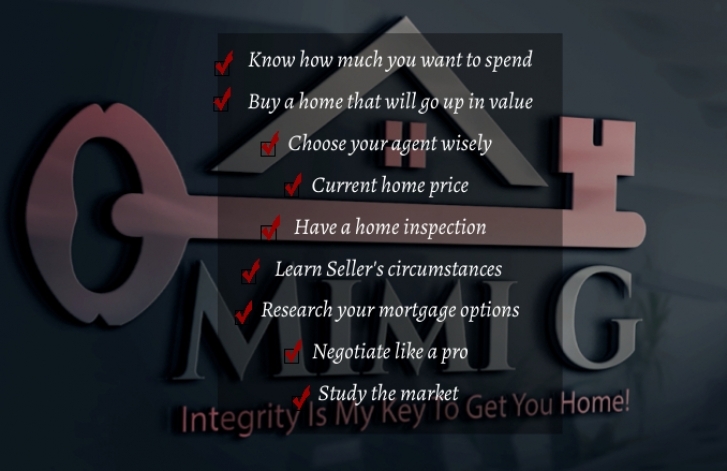Welcome
Need help with houses for sale in GTA?
I specialize in residential and commercial property.
I can help.
Check out my 10 buyer’s tips to get you started.

#1 Know how much you want to spend / Get a preapproval letter
Don’t get caught in that trap of finding a perfect home that you can’t afford. Do your homework and define your budget.
You can get pre-qualified for a mortgage, which simply gives you an estimate of how much a lender may be willing to lend based on your income and debts. But as you get closer to buying a home, it’s smart to get a preapproval, where the lender thoroughly examines your finances and confirms in writing how much it’s willing to lend you, and under what terms. Having a preapproval letter in hand makes you look much more serious to a seller and can give you an upper hand over buyers who haven’t taken this step.
Look at properties that cost less than the amount you were approved for. Although you can technically afford your preapproval amount, it’s the ceiling — and it doesn’t account for other monthly expenses or problems like a broken dishwasher that arise during homeownership, especially right after you buy. Shopping with a firm budget in mind will also help when it comes time to make an offer.
In our current real estate market with limited inventory, it’s likely you’ll bid on houses that get multiple offers. When you find a home you love, it’s tempting to make a high-priced offer that’s sure to win. But don’t let your emotions take over. Shopping below your preapproval amount creates some wiggle room for bidding. Stick to your budget to avoid a mortgage payment you can’t afford.
#2: It Is Very Important To Buy A Home That Will Go Up In Value.
Slow, steady home appreciation has been the rule over most of the nation’s history, and many real estate investors became quite wealthy in that environment. They did so by very carefully analyzing the appreciation potential of their investment, and they invested for the long term. You should too. Even if you plan on living in your home just a few years, you will want it to have gone up in value when you put it back on the market.
#3 Choose Your Agent Wisely
Some people think they can save money by not using a buyer’s agent. In most cases, this is simply not true; and in fact, it is usually just the opposite. In residential real estate, the commission is usually paid by the seller whether or not a buyer’s agent is involved. Where else can you employ the services and receive the benefits of a trained and experience professional on your side for free?
If you are using a real estate agent look for one with experience in working with buyers, with knowledge of the neighborhood(s) you are considering. The purchase of a home is a serious long term commitment on your part and a good agent will recognize that buyers need time and patience so they can satisfactorily sort out the myriad’s of factors involved in a purchase decision.
The right Agent will:
- Attend and monitor your home inspection
- Order any additional required inspections (well, septic, radon, etc.)
- Confirm lender terms & status of loan application
- Monitor any contingencies, conditions, etc.
- Monitor & troubleshoot transaction in progress (includes the anticipation of potential pitfalls and efforts to circumvent them)
- Attend final walk thru
- Attend Closing
#5: Current Home Prices Are A Less Important Consideration Than Interest Rates.
Try to buy and/or sell when interest rates are low. The amount of mortgage you can afford (and thus the price of the home you will consider) will change as the interest rates rise or fall. A certain asking price may sound expensive to you, but at a lower interest rate you might be able to afford it. You may own several homes over your lifetime, and the factors that will limit or increase the value of the home you will be selling will similarly affect the price of its replacement. Since those factors largely wash each other out, interest rates remain the most important factor.
#6: Have A Home Inspection Contingency
Always have a home inspection contingency in your offer and always hire a professional home inspector to provide you a written report, along with “ball park” estimates or ranges of repair costs. If the inspection turns up problems that weren’t readily noticeable, you can use it and the ball park estimates for negotiating leverage to get the seller to make the repairs or provide you a commensurate price reduction.
#7: Learn As Much As Possible About The Seller’s Circumstances.
There may be mutually beneficial opportunities. For example if you might face difficulty qualifying for a big enough mortgage, and the seller is worried about college costs for his or her sixth grader, then maybe the seller might be interested in accepting a second trust for part of the purchase price if the interest rate is above what they could otherwise earn and the loan is paid off the summer before the child’s freshman college year. From your perspective the rate will likely be less than you could get from a traditional lender.
#8: Research Your Mortgage Options Well Before You Make An Offer.
You won’t have enough time in the five days sellers normally allow to get all of your paperwork together, determine the best kind of mortgage, who is offering the best rates etc. Get a contingent letter of approval for a loan, or an actual loan commitment prior to making an offer. The former is not actually a loan commitment, but rather a contingent approval for a loan up to a certain amount. While it has relatively little enforceable value, it nevertheless can impress a seller, who might be more willing to accept a lower offer because of the perceived financial capabilities of the seller. Its also possible to get approved by a lender with a longer term “lock” on the interest rate in order to protect you from subsequent rate increases. While this should substantially increase your negotiating leverage, keep in mind that you pay more directly or indirectly for the longer commitment, either in terms of the rate and/or points.
#9: Learn How To Negotiate Like A Pro.
There’s more money involved in this negotiation than just about any other area you’ll encounter. Even if you’re using a buyer’s agent, you’re part of the team, and you’ll have to make the ultimate decisions about how much to offer and how much to compromise on a counter offer.
#10: STUDY! The tips in this website are only the beginning.
You’ll need to learn a lot more if you want to get the best possible deal. Read as much as you can on home buying, on negotiating, on neighborhoods in your area that might fit your needs, and on factors that impact long term appreciation like schools, infrastructure, major new business expansions or closing etc. Keep copies of everything you send the lender and everything the lender sends you.
If you are thinking of buying or need to lean more please reach out.

Mimi Gebremedhin
Sales Representative
Cell: 416.9304444
Office: 416.256.0888
Fax: 416.256.0887
Email: mimi@mimirealtor.ca
